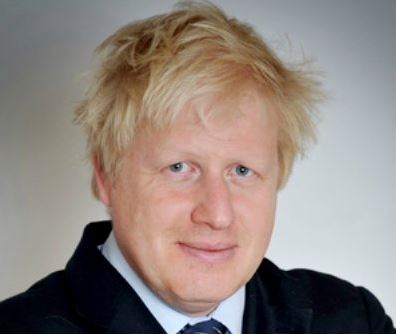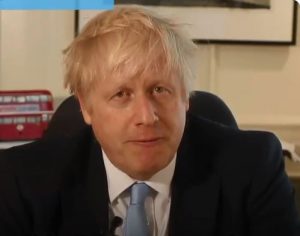
New York Times: The race to succeed David Cameron as prime minister of Britain was turned upside down on Thursday when Boris Johnson, widely seen as the leading candidate, chose at the last minute not to run, after his close ally Michael Gove challenged him for the job.
The unexpected turn of events was the latest political aftershock from Britain’s vote last week to leave the European Union, and it could benefit another candidate, Theresa May, the home secretary, who laid out her case on Thursday for why she should lead the party.
“Last week, the people of this country voted to take a new path and a new direction for Britain, in a decision that I passionately support,” Mr. Johnson said. “It is vital now to see this moment for what it is. This is not a time to quail, it is not a crisis, nor should we see it as an excuse for wobbling or self-doubt, but it is a moment for hope and ambition for Britain. A time not to fight against the tide of history, but to take that tide at the flood, and sail on to fortune.”
But Mr. Johnson said he was not the person to unite the party, and that the circumstances were no longer right for him to bring the country together.
The emerging competition between Mr. Gove, 48, and Ms. May, 59, is now the dominant dynamic in Britain’s fast-moving political upheaval.
Ms. May, who supported staying in the European Union but was a relatively quiet voice in that debate, is considered a candidate of continuity who is farther to the right of the party than Mr. Cameron. She had been thought to have the best chance of derailing the flamboyant and popular Mr. Johnson.
Only on Wednesday, Mr. Gove, who had said he was not interested in becoming prime minister, was thought to have made a deal to support Mr. Johnson. But in a statement Thursday morning, Mr. Gove said that over the last few days, he had “come, reluctantly, to the conclusion that Boris cannot provide the leadership or build the team for the task ahead.”
Last Friday, the day after the British referendum, Prime Minister David Cameron announced that he would resign by October.
“Game of Thrones” is derived from centuries of English history, and the Conservative Party is following a similar script, with friends betrayed and secret deals. Several candidates are running to raise their profiles and increase their bargaining power with the prospective victor, for example, Stephen Crabb, a young Welsh lawmaker and the work and pensions secretary, who entered the leadership contest on Wednesday, and Andrea Leadsom, a minister for energy, who declared her candidacy on Thursday.
Ms. May, laying out her case in a speech on Thursday, promised “a sensible and orderly departure from the European Union.” She ruled out the possibility of a referendum, saying, “Brexit means Brexit.”
Ms. May portrayed herself as a candidate for ordinary voters. “If you’re from an ordinary working-class family, life is just much harder than many people in politics realize,” she said. “You have a job, but you often don’t have job security.”
She added, “Frankly, not everybody in Westminster understands that,” referring to Parliament.
In a veiled jab at Mr. Johnson, she said: “What happens in government isn’t a game. It is serious business that has real consequences for people’s lives.”
Ms. May has been occasionally likened to the former Conservative prime minister Margaret Thatcher, as they both came from humble roots. “I grew up the daughter of a local vicar, and the granddaughter of a regimental sergeant-major,” Ms. May said. “Public service has been a part of who I am for as long as I can remember.
She added: “I’m not a showy politician,” eschewing frequent television appearances, gossip and drinks at Parliament’s bars. “I just get on with the job in front of me.”
The various candidates will be winnowed down to two by successive votes by Conservative Party members of Parliament. The next leader will then be chosen among the two by the 150,000 or so registered members of the party, with an outcome to be announced on Sept. 9.
The opposition Labour Party, too, is in the midst of a leadership struggle. The incumbent, Jeremy Corbyn, overwhelmingly lost a no-confidence vote among Labour’s members of Parliament, but he has said he will not resign. He is being challenged by Angela Eagle, the former Labour spokeswoman for business, who is believed to have the support of the 51 Labour legislators required to force a leadership contest, which is also expected to run into September if Mr. Corbyn remains in his job.
Mr. Gove, who was unpopular in his previous cabinet post as education secretary, has been a close friend of Mr. Cameron, who expected Mr. Gove to back the “Leave” campaign. Mr. Cameron’s aides have been widely reported as seeking to block the rise of Mr. Johnson, who only backed Leave at the last minute, even though Mr. Cameron had promised him his choice of almost any job in the government to back “Remain.”
Mr. Johnson is popular in the country and is an excellent campaigner, and he is generally considered to have done a good job as mayor of London, although the job has relatively little power.
But he is mistrusted by some in the party as a showman, more comfortable with the game of politics than the substance of government. And it has been evident in the days since last Thursday’s vote that Mr. Johnson and Mr. Gove had no agreed-upon plan for what to do if they won the referendum, and that they have disagreements about how to approach the future.
In a personal email to Mr. Gove from his wife, the journalist Sarah Vine, that was leaked on Wednesday, she urged her husband to approach a commitment to Mr. Johnson with skepticism, and to lock down any commitments beforehand, especially on controls over immigration.
She encouraged Mr. Gove to have “leverage” in his dealings with Mr. Johnson, claiming that without Mr. Gove’s support, the Conservative Party membership will not have “the necessary reassurance to back Boris” in the leadership vote.




